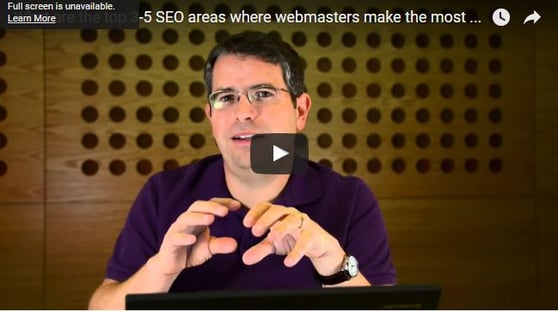Everyone who has ever managed their website's SEO knows that it’s a complicated field with many nuances, rumors, and changes, which makes it hard to define what really works. Some experiment months before they realize that SEO is not bringing the results they desire. Quite often, the reason is a deviation from basic SEO truths. Everything starts with learning, so let’s cover the most common optimization mistakes.
SEO mistake #1 – Non-crawlable website
Is your website indexable? Google Webspam team manager Matt Cutts commented on his recent video that the most common SEO mistake by volume is having a website that is not crawlable. When Google cannot find your website and define the content, how can your website show up in search results? For example, Google cannot index pages done in Flash. You can create an awesome design that has the wow effect, but what’s the benefit of having a super cool website if no one knows it exists?
SEO mistake #2 – Optimizing for keywords based on wrong indicators
It’s quite amazing how lightly the keywords are chosen for SEO. It’s completely intelligible that every business associates its products/services with certain terms used in internal circles. The question is whether a regular person uses those keywords in their search queries? Use Google Keyword Planner to figure that out. This free tool shows the keyword search volume by country and language and even suggests related keywords. Find out how your customers are searching and don’t underestimate keywords with low search volume as they are easy to optimize and bring more specific traffic to your page.
Another mistake is evaluating keywords by search traffic instead of conversion rate. It’s easy to generate traffic, but it’s a completely different thing to actually make them earn you profit. The traffic you get on your site may be completely irrelevant causing your site big bounce rate. So instead of giving credit to the most popular keywords find out the ones that are really valuable for your business. Google Analytics is a great tool to analyze keyword efficiency.
SEO mistake #3 – Ignoring meta data
Several SEO communities have claimed that meta data has lost its SEO value. In reality, metadata is still important. If not so much for the ranking factor, the usability remains a substantial reason to still use meta data. Page title i.e. <title> tag appears in search results as your site title and is an important signal for Google to determine ranking. The meta description appears as a search result description. This is the place where to stand out from competitors and snap the visitors from their noses.

SEO mistake #4 – Main focus on link building
Focusing on link building is a mistake made by many businesses. As Matt Cutts mentioned in the video, thinking about link building alone limits your mindset. It’s true that at the end of the 90s linking was as popular as Backstreet Boys. But now the game has changed. Linking is still one of the major ranking factors for Google but the circumstances have changed - quality instead of quantity.
Google algorithm changes fight against webspam and link schemes. Dare to use link farms and see what happens. Most likely your ratings will boost for the short term and drop significantly when Google discovers the scam. Matt recommends focusing on other things like quality content and marketing to earn links. This way natural links are generated that improves your site value for Google. Meaning that linking is an extra bonus for creating compelling and quality content, not a goal of its own.
SEO mistake #5 – Ignoring Google guidelines
Google offers free resources for webmasters to improve their SEO, including Google Webmaster Guidelines. Webmaster Guidelines and Webmaster Tools should be a bible for every SEO specialist. Not knowing the basics may cause you a lot of time and resources. Webmaster Guidelines outline exactly what Google wants you to do to achieve better rankings. Webmaster Tools provide you with important data to help you better understand what’s going on with your site and how to solve common problems.
SEO mistake #6 – Using forbidden techniques
Google Webmaster Guidelines define some SEO tactics as dishonest methods to improve your site ranking. Those methods are considered low quality and are forbidden by Google. Using the prohibited methods may cost your good reputation and get you banned from Google if discovered. Low-quality tactics include:
• Link farming
• Keyword stuffing
• Duplicated and/or irrelevant content
• Cloaking
• Hidden texts and keywords
• Doorway pages
• Google bowling
Trying to outsmart Google is dangerous and will end with poor results. Why waste your time and money on suspicious methods instead of focusing on quality SEO? Think further ahead than one week and invest in long-term results instead of practicing low-quality SEO and facing the dangers of dishonest optimization.
SEO mistake #7 – Doing SEO without professional help and never getting it done
Not that you have to outsource the SEO service – doing it all by yourself is great, even amazing if you can handle SEO next to your main job. As we know SEO changes very quickly. It was just a few months ago when Google declared that they value the analytics data as a ranking factor, after Penguin 2.0 new winds started blowing and branding is in the limelight. Following all the changes and implementing them requires both time to learn and time to manage. To be honest, do you have enough time and persistence to deal with SEO by yourself?






